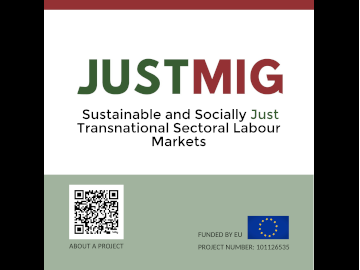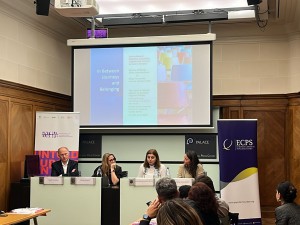Social partners’ perspective on temporary migrant employment in Slovenia
15. 9. 2025 | Politics

At the JUSTMIG closing conference in May 2025, two leading voices in labour rights and organising: Andraž Mali from the Center for Social Research (CEDRA) and Goran Lukić from the Counselling Office for Workers (Delavska svetovalnica) shared powerful insights from their work with migrant workers. CEDRA works closely with worker collectives, trade unions in Slovenia, and international partners such as UNI Global, focusing on service sectors like retail, logistics, and care. Delavska svetovalnica advocates for and protects the labour, social, and legal rights of workers and vulnerable groups, offering migrant workers direct support through legal advice, guidance, and assistance in asserting their rights.
Migrant workers as agents of collective struggle and labour segmentation as a strategy of discipline
Goran Lukić highlighted structural reasons for the growing influx of South Asian workers to Slovenia. He pointed to collective bargaining agreements as the central driver: “If you look at the figures in collective bargaining agreements, you can see that basic wages are far below the minimum wage, which creates a significant gap.” This wage gap makes migrant labour attractive to employers but exposes workers to exploitation. Many arrive already indebted (often more than €5,000 to visa-arranging agencies) forcing them to work more than 250 hours per month to repay debts. Employers, Lukić noted, take advantage of this vulnerability: “They don’t ask questions and work long hours. They don’t ask because they are not informed.”
He also drew attention to blurred boundaries between study and work, as foreign workers often enter Slovenia on student visas and later switch to work permits. According to Lukić, this has become a “small-scale industry,” where universities profit from tuition fees paid by students who are effectively workers.
Traditional unionism is no longer enough: Migrant workers as organizing nodes
Andraž Mali echoed the JUSTMIG policy brief for Slovenia, stressing that service sectors with high numbers of migrants are becoming ever more precarious, fragmented, and deregulated. Traditional union models, built around stable, long-term employment, no longer suffice. Instead, new forms of organising are needed: inclusive, democratic structures based on fieldwork, one-on-one conversations, interviews, and collective actions that empower workers as active participants.
Contrary to stereotypes, migrant workers are not merely vulnerable, they are already resisting. Fieldwork revealed informal organising practices such as refusing Sunday shifts, collective slowdowns, informal negotiations with supervisors, and pressure on agencies. Though often outside formal unions, these actions show strong collective agency. Mali emphasised the need to integrate such initiatives into broader struggles for equality and to extend the right to strike to all workers, regardless of contract type or employer. He also underlined the core contradiction of Slovenian migration policy: migrant workers are essential to sectors like logistics, retail, and care, yet are treated as temporary and disposable.
Labour segmentation as a class-dividing strategy
Research conducted with migrant workers revealed systematic practices of segmentation. Indian workers faced higher quotas and harsher penalties. Workers were divided not only by nationality but also by employment status: some directly employed, others hired via agencies, and operating under different company ownership structures. This fragmentation is not accidental, Mali argued, but a class-dividing strategy used to fragment collectives, weaken unions, and bypass regulations.
To counter this, unions and the state must limit agency work through sectoral and company-level bargaining and ensure mandatory conversion to permanent employment after a short period. Mali cited progress with the Tuš trade union, where agency workers must be offered permanent contracts after six months, but stressed that enforcement remains a challenge.
Relevance for JUSTMIG
The interventions of Lukić and Mali directly reflect the aims of JUSTMIG project: understanding how temporary labour migration is shaped by industrial relations, wage-setting mechanisms, and transnational labour market dynamics. Their insights show how imbalanced wage structures and debt-driven migration channels create systemic vulnerabilities that demand urgent policy attention.
Mali’s field perspective reinforces JUSTMIG’s finding that migrant workers are not only subjects of policy but active participants in shaping the future of labour markets. Strengthening their voice is essential for building more sustainable and socially just labour relations in Europe. Both speakers concluded that migrant workers stand at the centre of labour precarization; they are the most exploited, yet also increasingly indispensable. Migration should therefore be seen as a potential organising node. By identifying shared class interests, overcoming divisions, and rebuilding unity, unions and movements can defend and improve standards for all.
By exposing the links between collective agreements, agency practices, university enrolments, and employer demand, their contributions highlight why JUSTMIG’s focus on sustainable and socially just labour market adjustments is so timely. Addressing these structural issues is not only vital for protecting migrant workers but also for ensuring fairer labour conditions overall.


